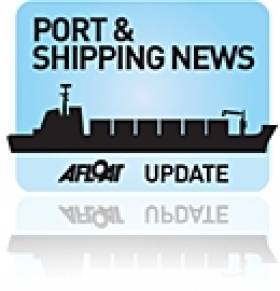Displaying items by tag: Irishregistered
The Future’s Green, Bright and Orange
This month ASN are due delivery of the 4,700 gross tonnes Arklow Bridge, the second 'B' class newbuild was also built by the Dutch company of Bodewes Shipyards B.V. She is the fifth vessel to carry this name since Arklow Shipping was founded in 1966.
The Arklow Bridge is registered in St. John's the capital of the Caribbean island of Antigua where she will be flagged. Antigua became an associated state of the Commonwealth until it was disassociated from Britain 30 years ago.
Her sister Arklow Brook entered service this year and is designed with two holds with a total (grain and bale) capacity of 9473.1m3 or an equivalent of 33,4524 ft3.
For cargo-separation the holds can be sub-divided by a portable bulkhead in up to 8 positions. In addition to carrying agricultural-based cargoes, the 116m (OA) overall long vessel can handle 177 (TEU) containers in the hold and another 88 can be stowed on top of the hold's hatch covers. Both the holds are fitted with dehumidifier's.
The power-plant is derived from a MaK 6M32C 2999kW main engine with a Renk gearbox and Berg controllable pitch propeller that provides around 12 knots.
With the entry of Arklow Bridge, the combined fleet is over 40 ships that trade in the north-west of Europe and the Mediterranean. For further vessel statistics of the sisters click here and for a photo of the new vessel click this link.
Asides the Rotterdam based operation of ASN, the Irish side of the company is the largest indigenous owned shipping company in terms of Irish-flagged and registered tonnage. Arklow is not only the headquarter's of ASL but the homeport is also where the vessels are registered.
- Dublin Port
- Co. Wicklow
- Arklow Shipping
- Newbuilds
- The Netherlands
- Arklow Shipping Ltd
- Ports and Shipping News
- Caribbean
- DryDock
- Antigua
- British
- Dublin Port news
- Arklow Bridge
- Arklow Brook
- ASN
- Arklow Shipping B.V.
- Irishflagged
- Irishregistered
- Arklow Future
- Bodewes Shipyards
- Dutchflagged
- Antiguaflagged
- Mak
- The Commonwealth
- River Avoca
























































